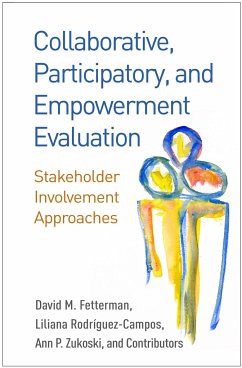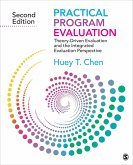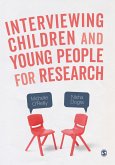David M Fetterman, Liliana Rodríguez-Campos, Ann P Zukoski, And Contributors
Collaborative, Participatory, and Empowerment Evaluation
Stakeholder Involvement Approaches
David M Fetterman, Liliana Rodríguez-Campos, Ann P Zukoski, And Contributors
Collaborative, Participatory, and Empowerment Evaluation
Stakeholder Involvement Approaches
- Broschiertes Buch
- Merkliste
- Auf die Merkliste
- Bewerten Bewerten
- Teilen
- Produkt teilen
- Produkterinnerung
- Produkterinnerung
From pioneering leaders in the field, this is the first book to provide a solid foundation for three major stakeholder involvement approaches: collaborative, participatory, and empowerment evaluation. Highlighting differences among the approaches, the authors focus on the role of the evaluator, who may be in charge of the evaluation, share control, or serve as a "critical friend," leaving stakeholders in control. Practitioners are guided to select and implement the most appropriate framework for the purpose and scope of a given evaluation and the needs of community members and funders.
Andere Kunden interessierten sich auch für
![Research Methods for the Behavioral Sciences Research Methods for the Behavioral Sciences]() Gregory J. Privitera (St. Bonaventure University)Research Methods for the Behavioral Sciences146,99 €
Gregory J. Privitera (St. Bonaventure University)Research Methods for the Behavioral Sciences146,99 €![Understanding Research Methods Understanding Research Methods]() Michelle NewhartUnderstanding Research Methods105,99 €
Michelle NewhartUnderstanding Research Methods105,99 €![Collaborative Research in Theory and Practice Collaborative Research in Theory and Practice]() Kate Pahl (Manchester Metropolitan University)Collaborative Research in Theory and Practice27,99 €
Kate Pahl (Manchester Metropolitan University)Collaborative Research in Theory and Practice27,99 €![Practical Program Evaluation Practical Program Evaluation]() Huey T. ChenPractical Program Evaluation125,99 €
Huey T. ChenPractical Program Evaluation125,99 €![Interviewing Children and Young People for Research Interviewing Children and Young People for Research]() Michelle O'ReillyInterviewing Children and Young People for Research34,99 €
Michelle O'ReillyInterviewing Children and Young People for Research34,99 €![Evaluation Failures Evaluation Failures]() Evaluation Failures44,99 €
Evaluation Failures44,99 €![Interpreting Quantitative Data with IBM SPSS Statistics Interpreting Quantitative Data with IBM SPSS Statistics]() Rachad AntoniusInterpreting Quantitative Data with IBM SPSS Statistics84,99 €
Rachad AntoniusInterpreting Quantitative Data with IBM SPSS Statistics84,99 €-
-
-
From pioneering leaders in the field, this is the first book to provide a solid foundation for three major stakeholder involvement approaches: collaborative, participatory, and empowerment evaluation. Highlighting differences among the approaches, the authors focus on the role of the evaluator, who may be in charge of the evaluation, share control, or serve as a "critical friend," leaving stakeholders in control. Practitioners are guided to select and implement the most appropriate framework for the purpose and scope of a given evaluation and the needs of community members and funders.
Produktdetails
- Produktdetails
- Verlag: Guilford Publications
- Seitenzahl: 172
- Erscheinungstermin: 28. November 2017
- Englisch
- Abmessung: 229mm x 154mm x 15mm
- Gewicht: 318g
- ISBN-13: 9781462532827
- ISBN-10: 1462532829
- Artikelnr.: 48254491
- Verlag: Guilford Publications
- Seitenzahl: 172
- Erscheinungstermin: 28. November 2017
- Englisch
- Abmessung: 229mm x 154mm x 15mm
- Gewicht: 318g
- ISBN-13: 9781462532827
- ISBN-10: 1462532829
- Artikelnr.: 48254491
David M. Fetterman, PhD, is president and CEO of Fetterman and Associates, an international evaluation consulting firm, and the founder of empowerment evaluation. Dr. Fetterman has worked in more than 17 countries--in South African townships and Native American reservations, as well as in Silicon Valley tech firms, including Google and Hewlett-Packard--and has 25 years of experience at Stanford University, serving as a School of Education faculty member, the School of Medicine director of evaluation, and a senior member of the University administration. He currently serves as a faculty member at Pacifica Graduate Institute and Claremont Graduate University. Dr. Fetterman is past president of the American Evaluation Association (AEA) and the Council on Anthropology and Education of the American Anthropological Association (AAA). He is a recipient of honors including the Paul F. Lazarsfeld Evaluation Theory Award and the Alva and Gunnar Myrdal Evaluation Practice Award from the AEA; the President's Award from the AAA; the Distinguished Scholar Award from the Research on Evaluation Special Interest Group of the American Educational Research Association; and the Award for Excellence in Research from the Mensa Foundation. He is the author or editor of numerous books. Liliana Rodríguez-Campos, PhD, is Director of the Graduate Certificate in Evaluation and Professor in the Department of Educational and Psychological Studies at the University of South Florida. She is a former director of the Center for Research, Evaluation, Assessment, and Measurement. Nationally and internationally recognized for her contributions to collaborative evaluation, Dr. Rodríguez-Campos is co-chair of the Collaborative, Participatory, and Empowerment Evaluation Topical Interest Group of the American Evaluation Association (AEA), serves on the board of directors of the Evaluation Capacity Development Group, and is a recipient of the Marcia Guttentag Award from the AEA, among other honors. She has facilitated many training sessions and presented her work in more than 30 countries. Ann P. Zukoski, DrPH, MPH, has conducted research and evaluation in community-based and public health settings since the 1990s, with a particular interest in using participatory evaluation to assess systems and policy change. She leads the Evaluation and Research Team at the Office of Statewide Health Improvement Initiatives of the Minnesota Department of Health. Previously, Dr. Zukowski was a senior research associate at Rainbow Research in Minneapolis, a faculty member in the Department of Public Health at Oregon State University, a senior evaluation associate for the California Public Health Institute, and a senior research associate at the University of California, Berkeley, School of Public Health. She has conducted research and evaluations funded by a variety of national, state, and county government agencies, as well as private foundations. She served as a Peace Corps Volunteer in Berberati, Central African Republic.
1. An Introduction to Collaborative
Participatory
and Empowerment Evaluation Approaches
David Fetterman
Liliana Rodríguez-Campos
Abraham Wandersman
Rita Goldfarb O'Sullivan
& Ann Zukoski 2. Essentials of Collaborative Evaluation
Liliana Rodríguez-Campos 3. A Collaborative Evaluation of an Aquarium (Marine Life Program)
Liliana Rodríguez-Campos
Rigoberto Rincones-Gómez
& Rosalyn Roker 4. A Collaborative Evaluation of a Multisite
Multipurpose
Multiyear Early Childhood Quality Care Initiative
Rita Goldfarb O'Sullivan 5. Essentials of Participatory Evaluation
Ann Zukoski & Cate Bosserman 6. A Participatory Evaluation of a Community Health Improvement Initiative
Ann Zukoski
Cate Bosserman
& Courtney Baechler 7. A Participatory Evaluation of a Community Justice Program for Sex Offenders
Jill Anne Chouinard 8. Essentials of Empowerment Evaluation
David Fetterman & Abraham Wandersman 9. An Empowerment Evaluation of a Comprehensive Sex Education Initiative
Margret Dugan 10. A Google-Enhanced Empowerment Evaluation Approach in a Graduate School Program
David Fetterman & Jason Ravitz 11. Similarities across the Three Approaches:Principles and Practices in Common
David Fetterman
Liliana Rodríguez-Campos
Abraham Wandersman
Rita Goldfarb O'Sullivan
& Ann Zukoski 12. Conclusion: Highlighting the Present and Looking to the Future
David Fetterman
Liliana Rodríguez-Campos
Abraham Wandersman
Rita Goldfarb O'Sullivan
& Ann Zukoski
Participatory
and Empowerment Evaluation Approaches
David Fetterman
Liliana Rodríguez-Campos
Abraham Wandersman
Rita Goldfarb O'Sullivan
& Ann Zukoski 2. Essentials of Collaborative Evaluation
Liliana Rodríguez-Campos 3. A Collaborative Evaluation of an Aquarium (Marine Life Program)
Liliana Rodríguez-Campos
Rigoberto Rincones-Gómez
& Rosalyn Roker 4. A Collaborative Evaluation of a Multisite
Multipurpose
Multiyear Early Childhood Quality Care Initiative
Rita Goldfarb O'Sullivan 5. Essentials of Participatory Evaluation
Ann Zukoski & Cate Bosserman 6. A Participatory Evaluation of a Community Health Improvement Initiative
Ann Zukoski
Cate Bosserman
& Courtney Baechler 7. A Participatory Evaluation of a Community Justice Program for Sex Offenders
Jill Anne Chouinard 8. Essentials of Empowerment Evaluation
David Fetterman & Abraham Wandersman 9. An Empowerment Evaluation of a Comprehensive Sex Education Initiative
Margret Dugan 10. A Google-Enhanced Empowerment Evaluation Approach in a Graduate School Program
David Fetterman & Jason Ravitz 11. Similarities across the Three Approaches:Principles and Practices in Common
David Fetterman
Liliana Rodríguez-Campos
Abraham Wandersman
Rita Goldfarb O'Sullivan
& Ann Zukoski 12. Conclusion: Highlighting the Present and Looking to the Future
David Fetterman
Liliana Rodríguez-Campos
Abraham Wandersman
Rita Goldfarb O'Sullivan
& Ann Zukoski
1. An Introduction to Collaborative
Participatory
and Empowerment Evaluation Approaches
David Fetterman
Liliana Rodríguez-Campos
Abraham Wandersman
Rita Goldfarb O'Sullivan
& Ann Zukoski 2. Essentials of Collaborative Evaluation
Liliana Rodríguez-Campos 3. A Collaborative Evaluation of an Aquarium (Marine Life Program)
Liliana Rodríguez-Campos
Rigoberto Rincones-Gómez
& Rosalyn Roker 4. A Collaborative Evaluation of a Multisite
Multipurpose
Multiyear Early Childhood Quality Care Initiative
Rita Goldfarb O'Sullivan 5. Essentials of Participatory Evaluation
Ann Zukoski & Cate Bosserman 6. A Participatory Evaluation of a Community Health Improvement Initiative
Ann Zukoski
Cate Bosserman
& Courtney Baechler 7. A Participatory Evaluation of a Community Justice Program for Sex Offenders
Jill Anne Chouinard 8. Essentials of Empowerment Evaluation
David Fetterman & Abraham Wandersman 9. An Empowerment Evaluation of a Comprehensive Sex Education Initiative
Margret Dugan 10. A Google-Enhanced Empowerment Evaluation Approach in a Graduate School Program
David Fetterman & Jason Ravitz 11. Similarities across the Three Approaches:Principles and Practices in Common
David Fetterman
Liliana Rodríguez-Campos
Abraham Wandersman
Rita Goldfarb O'Sullivan
& Ann Zukoski 12. Conclusion: Highlighting the Present and Looking to the Future
David Fetterman
Liliana Rodríguez-Campos
Abraham Wandersman
Rita Goldfarb O'Sullivan
& Ann Zukoski
Participatory
and Empowerment Evaluation Approaches
David Fetterman
Liliana Rodríguez-Campos
Abraham Wandersman
Rita Goldfarb O'Sullivan
& Ann Zukoski 2. Essentials of Collaborative Evaluation
Liliana Rodríguez-Campos 3. A Collaborative Evaluation of an Aquarium (Marine Life Program)
Liliana Rodríguez-Campos
Rigoberto Rincones-Gómez
& Rosalyn Roker 4. A Collaborative Evaluation of a Multisite
Multipurpose
Multiyear Early Childhood Quality Care Initiative
Rita Goldfarb O'Sullivan 5. Essentials of Participatory Evaluation
Ann Zukoski & Cate Bosserman 6. A Participatory Evaluation of a Community Health Improvement Initiative
Ann Zukoski
Cate Bosserman
& Courtney Baechler 7. A Participatory Evaluation of a Community Justice Program for Sex Offenders
Jill Anne Chouinard 8. Essentials of Empowerment Evaluation
David Fetterman & Abraham Wandersman 9. An Empowerment Evaluation of a Comprehensive Sex Education Initiative
Margret Dugan 10. A Google-Enhanced Empowerment Evaluation Approach in a Graduate School Program
David Fetterman & Jason Ravitz 11. Similarities across the Three Approaches:Principles and Practices in Common
David Fetterman
Liliana Rodríguez-Campos
Abraham Wandersman
Rita Goldfarb O'Sullivan
& Ann Zukoski 12. Conclusion: Highlighting the Present and Looking to the Future
David Fetterman
Liliana Rodríguez-Campos
Abraham Wandersman
Rita Goldfarb O'Sullivan
& Ann Zukoski








